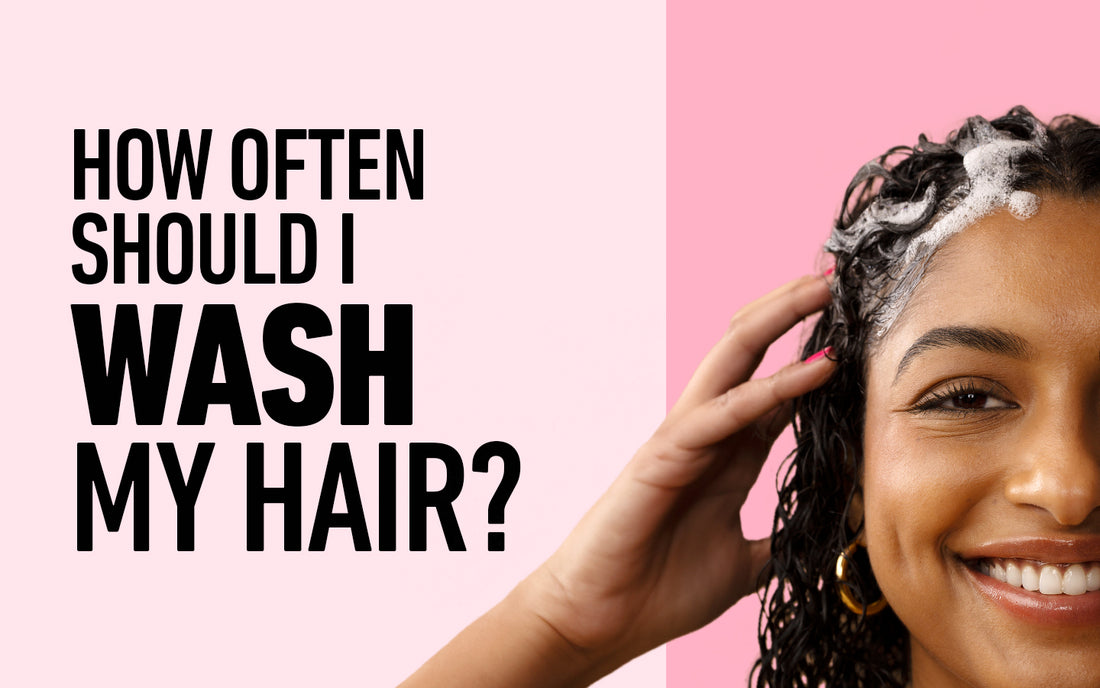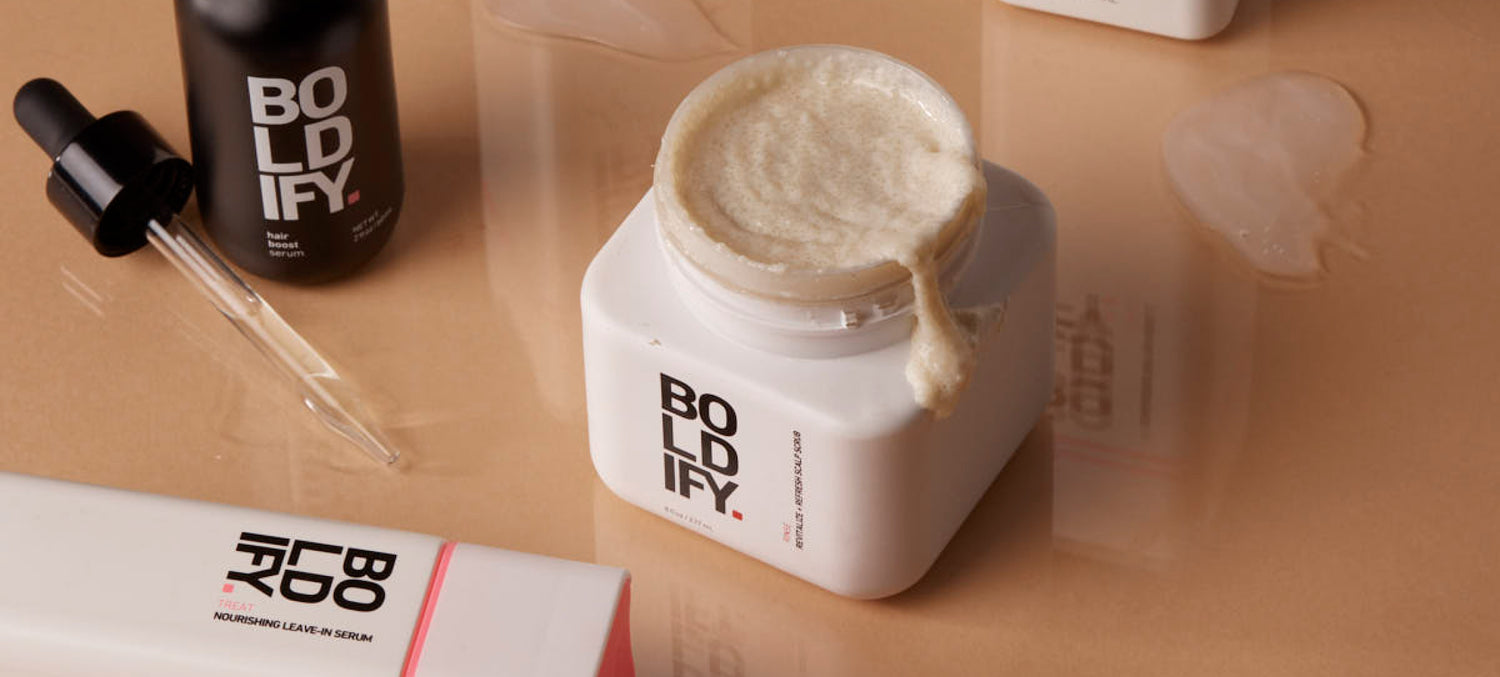How Often Should I Wash My Hair?

Fresh hair feels awesome, no doubt. But as with all great things in life — like bacon, wine and Netflix marathons — “too little” or “too much” are always a possibility, and your hair washing habits are no exception!
Some folks adhere to the “every day” standard without realizing that it’s not optimal for them personally, while others subscribe to a more laid-back, once-or-twice-a-week approach, not taking into consideration that what’s good for the goose isn’t always what’s good for the gander.
So we’re left with the question: how many times a week should you shampoo?The answer is: however many times is optimal for you, your scalp, and your hair!
(I know, I know...that means the answer is different for everyone. But if we gave it away in the first paragraph, you’d have no reason to keep reading!)
Below, we’ve put together the best tips for finding your hair-healthy balance when it comes to the number of times per week you should lather up, and tricks for managing your mane on the days in between.
Finding Your Balance
We’ve already determined that there’s really no textbook rule for hair-washing frequency...BUT, there are certainly helpful guidelines to assist you in assessing your individual needs!
What if I told you this: In general, once-per-week shampooing is recommended for maintaining clean hair without interrupting its natural moisture balance.
I’m far from clairvoyant, but I’m willing to bet that some of you thought “That sounds about right!”, while others are undoubtedly thinking “Are you CRAZY?! My head would be oilier than the garlic cloves in Emeril’s frying pan!!”
Which is where the aforementioned “helpful guidelines” come into play. Taking into consideration factors like your hair type and lifestyle will be key in determining the right number of washes per week for you.
Consideration #1: The 3 T’s
The type, texture and thickness of your hair is by far the most important consideration when deciding exactly how often you should ‘poo your ‘do.
Folks with fine, super smooth, or thinning locks tend to require more frequent washing, as hair is easily weighed down with even the smallest amount of scalp-produced oil (also known as sebum). Particularly soft strands are no match for these oils, carrying them from root-to-tip in a matter of hours, lending a thin, flat, lifeless appearance that isn’t easily remedied without a good shampooing.
On the other hand, folks with thick, coarsely textured hair tend to do well with fewer washes per week, as the sebum produced is less likely to noticeably weigh strands down and, in many cases, actually helps to improve manageability and provide a smoother texture and supple shine. 
Consideration #2: Hair Length
The long and short of it is that longer hair tends to be more easily restyled on the “no-shampoo” days. This is true for a couple of reasons: A - There is more hair to absorb scalp oils, so long locks aren’t as quickly weighed down as short styles, and B - More length provides more styling options.
Shorter styles really shine on shampoo days, as they’re freshly cleansed and perfectly coiffed into position...but, after a full day of wear and a night’s sleep sweatily sandwiched between your head and your pillow, Day 2 is often a challenge. Already encased in yesterday’s sebum, a Day 2 pixie cut is a wily beast, not easily tamed by a once-over with a flatiron. Longer styles, however, don’t tend to matte as quickly under the same conditions, and are much easier to re-work with a creative touch and some styling expertise come Day 2.
While short hair is typically cut into a specific shape in order to facilitate similar styling day in and day out, longer hair can be styled in a multitude of ways - down, front-bump, half-up, ponytail, messy bun, intricate updos - you name it, longer locks make it possible! Such options make it much easier to create a clean, stylish look on the “in-between” days with longer hair.
Consideration #3: Lifestyle
What do a steady diet of greasy foods and working up a sweat at the gym every day have in common? Seemingly not a whole lot...by all accounts, they’re good indicators of polar opposite lifestyles.
Surprisingly, there is a common thread!
When considered in terms of hair health, both can have a similar effect: An increased presence of debris on the scalp. (“Debris” meaning sebum, oils, sweat, dandruff, etc.)
It only makes sense that certain habits can alter the number of shampoos needed to maintain a clean, healthy scalp. Those who eat a cleaner diet and don’t tend to sweat profusely are more likely to get away with only 1 or 2 shampoos a week, while those who don’t as carefully watch what they eat or who work up a healthy sweat regularly are more likely to require more frequent hair washing to remove scalp-sabotaging, strand-slathering debris.
Consideration #4: Shampoo, Conditioner, and Styling Product Selection
The Hair Care aisle at any local retail store is confirmation enough that there are more choices for shampoo, conditioner, and styling products than any reasonable human requires…and, yet, as the “grooming graveyard” in the average medicine cabinet can attest, many of us have given a ridiculous number of them a go at one time or another.
Contrary to what companies would have us believe, product selection should involve more than simply choosing the bottle that most readily attracts your attention or the scent that tickles your senses in all the right ways.
Would you wash your hair with laundry detergent? Probably not! So why in the world do the same ingredients show up in many shampoos and conditioners?!
The Answer: Because many companies use harsh chemicals, like sulfates and parabens, to “cleanse” and “detangle”, in the most basic sense of the words, and as cheaply as possible. Although such shampoos effectively remove debris like oil and dandruff, they also strip the scalp and strands of essential oils and nutrients; while such conditioners effectively whip hair into some semblance of a smooth, detangled style, they’re not actually providing nourishment and repairing damage. Ultimately, all of this leads to hair health issues like dryness, split ends, breakage, and excessive fall, as well as scalp irritation, itching, flaking -- and follicular inflammation that can cause hair thinning and even balding if not corrected.
The Solution: Go for a natural option! Every bit as effective as their chemically-enhanced counterparts, natural shampoos and conditioners don’t bulldoze through dirt and oil with harsh chemicals. Rather, they’re made with botanicals and vitamins to nourish the scalp and hair, helping to keep what you’ve got healthy and aiding in new hair growth.
If you think selecting the right shampoo and conditioner is important -- you’re right.
BUT, it’s equally vital to understand the importance of selecting styling products that are a benefit to your style, not a detriment to it. After all, shampoo and conditioner are on your hair for all of 4 minutes per use...but styling products stay in all day, every day!
Seek out products that are as natural in form as possible, without sacrificing functionality. Realistically, you may select a product for its natural ingredients, but you’ll only continue using it if it yields the desired result.
While ingredients and efficacy are key, another factor to note is proper use. Dry Shampoo, for example, can certainly give you a boost on the in-between days, but over-application or using it too many days in a row without washing can cause harmful, follicle-clogging buildup -- effectively suffocating the scalp. If you’re choking, you’re choking -- whether it’s on a chocolate truffle or an apple...and the same applies to your scalp! A clogged follicle is a clogged follicle - whether it’s with parabens or botanicals. And a clogged follicle nourishes no hair, friends.
Consideration #5: Looking Your Best On the “In-Between” Days
“No shampooing” does NOT equal “no styling”...while you may not have to wash/condition your hair on the “in-between” days, you still need to make it look and feel good!
Below, we’ve compiled a few tips and tricks, from method to product, to keep you looking your best between washes. (Be sure to keep Consideration #4 in mind when selecting products!)
Rinse and Restyle: Just because you’re not shampooing doesn’t mean you can’t give your scalp a good massage and your strands a good rinse in the shower! Doing so is a gentle way to remove debris between cleansing sessions, and aid in easing re-styling between shampoos.
Dampen and Refresh: Brushing, spritzing locks with a touch of water, and blow-drying is a quick, easy way to bring new life to second (or third, or fourth…) day hair and refresh your style. This trick is especially effective for shorter styles that tend to matte overnight...spritz and blow-dry with a small, boar-bristle round brush to restore shape and shine in no time!
Sea Salt or Thickening Spray: Anyone who’s tried a Sea Salt or Thickening Spray can attest to the fact that they can, in certain instances, be a bit drying. With everyday washes, hair can become brittle over time...BUT, this effect can be fantastically leveraged on in-between days to help manage oil and restore texture for an optimal finish and an extra touch of hold! Simply brush hair, dampen with a few spritzes of water, apply the spray evenly from root to tip, scrunch/tousle, and blow-dry for renewed volume or allow to air-dry for a natural fullness.
Dry Texture Spray: Sometimes we get lucky, and our hair holds its shape from one day to the next...but as the scalp produces oils and those oils are dispersed to coat strands, a shine that is less “healthy” and more “accidental” can occur. Queue: Dry Texture Spray. This is a fantastic option for adding a bit of texture and reducing shine to enhance manageability and provide a soft matte finish on the in-between days.
Dry Shampoo: The name really says it all...Dry Shampoo is sprayed onto dry hair, left in place for a minute or two to absorb oil, then brushed out, theoretically taking unwanted debris with it. While Dry Shampoos are great in theory, finding a good one that nourishes the scalp and doesn’t leave behind stiffness or residue is vital...after all, scalp irritation and visible residue will only make you have to wash your hair more often!
Consider a Clarifying Shampoo: Think of clarifying shampoo as regular shampoo on steroids...more “muscle” to lift away stubborn build-up like hard water minerals, dandruff, product build-up, and oils. Probably sounds a bit counterintuitive at first...but, rotating your regular shampoo with a clarifying shampoo on wash days can help you achieve a cleaner “baseline” -- in turn allowing you to go further between washes with less accumulated debris. For best results, be sure to choose a natural clarifier, and use no more than every other wash or once per week (whichever is less often).
So, what’s it all mean? Only you can be the judge of that! Now that you have the basics, finding your happy place wash-wise is a simple matter of trial and error. I hope that these tips and tricks will ease the process for you, and help you find your #washnumber in record time!
Get thicker, fuller, more voluminous hair
from the first wash!



